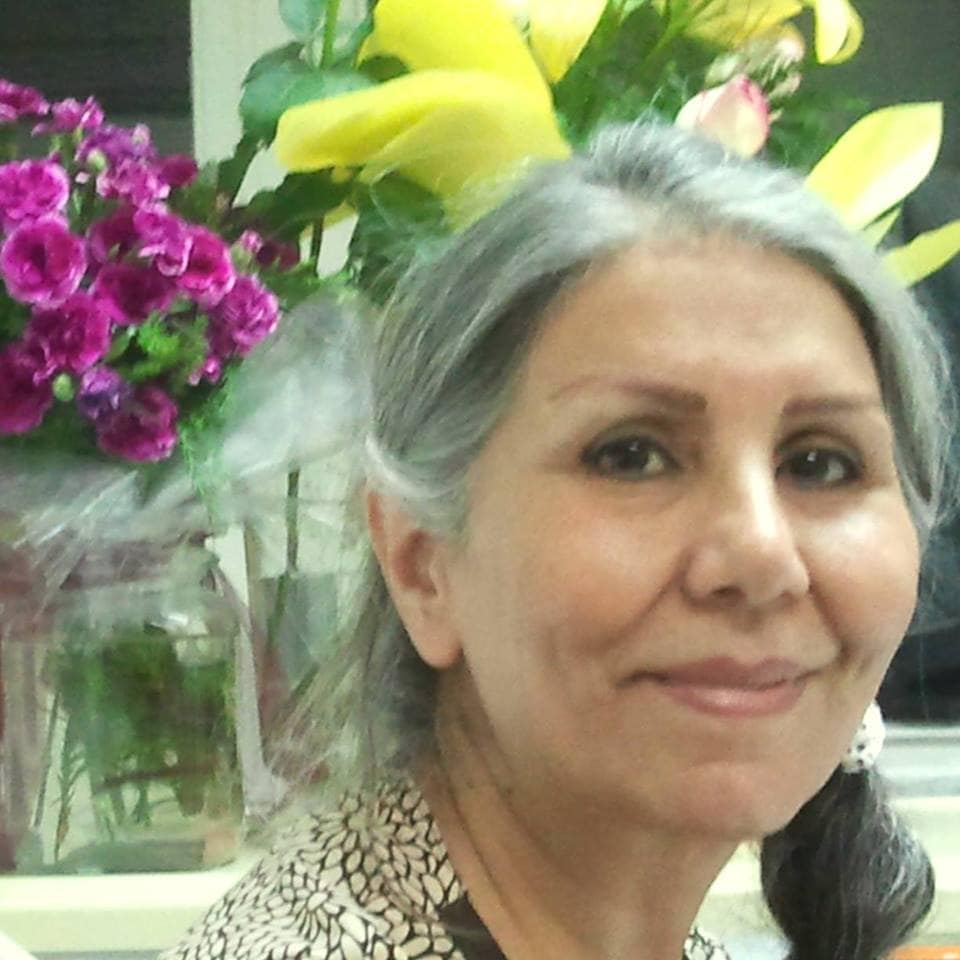Teacher and poet Mahvash Sabet is currently serving a 20-year prison sentence in Evin prison, Tehran. PEN International is calling on the Iranian authorities to release her and all other writers imprisoned in Iran for their work.
This article was originally published on pen-international.org on 10 November 2014.
“Beyond those gates, another world, another race, a people poisoned and oppressed by woe; they stared wearily at us, the prisoners we faced, with sunken eyes, lack-lustre, circled with sorrow” – extract from ‘From Evin to Raja’I Shah’ in Prison Poems, published in English on 1 April 2013.
Teacher and poet Mahvash Sabet is currently serving a 20-year prison sentence in Evin prison, Tehran. She is one of a group of seven Baha’i leaders known as the “Yaran-i-Iran” – “Friends of Iran” – who have been detained since 2008 for their faith and activities related to running the affairs of the Bahá’í community in Iran. Mahvash Sabet began writing poetry in prison, and a collection of her prison poems was published in English translation on 1 April 2013. PEN International is calling on the Iranian authorities to release Mahvash Sabet and all other writers imprisoned in Iran solely for exercising their right to legitimate freedom of expression.
The Baha’i community in Iran has been the focus of a systematic, state-sponsored persecution since the Islamic Revolution of 1979. After the revolution, the “Yaran-i-Iran” – “Friends of Iran” – was formed with the full knowledge of the government and served as an informal council for the Baha’i in Iran, working to support the spiritual and social needs of Iran’s 300,000-member Baha’i community, until its entire membership was arrested in 2008. Teacher and poet Mahvash Sabet was arrested on 5 March 2008 while on a trip to Mashhad. The other six members of the group – Fariba Kamalabadi, Jamaloddin Khanjani, Afif Naeimi, Saeid Rezaie, Behrouz Tavakkoli, and Vahid Tizfahm – were arrested on 14 May 2008 at their homes in Tehran. All were imprisoned without charge until January 2010, during which they were held incommunicado for weeks and were not allowed access to legal counsel. All suffered appalling treatment and deprivations during pre-trial detention.
Charged with espionage, propaganda against the Islamic republic, the establishment of an illegal administration, cooperation with Israel, sending secret documents outside the country, acting against the security of the country, and corruption on earth, their trial began on 12 January 2010. On 14 June 2010 each of the defendants was sentenced to 20 years’ imprisonment, after six brief court sessions characterised by their lack of due legal process. Their sentences were later reduced to 10 years each when an appeals court revoked three of the charges; however, in March 2011, the prisoners were informed of the reinstatement of their original sentences. They have never received official copies of the original verdict or the ruling on appeal despite repeated requests.
Mahvash Sabet, now aged 62, began her professional career as a teacher and worked as a principle at several schools. She also collaborated with the National Literacy Committee of Iran. Following the Islamic Revolution in 1979, Sabet was fired from her job and blocked from working in public education, like thousands of other Iranian Baha’i educators. She served for 15 years as director of the Baha’i Institute for Higher Education, which provides alternative higher education for Baha’i youth. She began writing poetry while in prison, a collection of which was published in English translation on 1 April 2013. Her poems are described as ‘sometimes a means of historical documentation…; sometimes a series of portraits of other women trapped in prison with her; sometimes meditations on powerlessness, on loneliness’…. She is married and has two grown children.
“My first encounter with Mahvash Sabet took place on a hot summer’s day. After many hours of tedious waiting in a special room set aside for lawyers, I was finally allowed to meet her in the presence of two women guards . . . it was obvious that the Baha’i prisoners had been deprived of fresh air and daylight for a long time; their entire beings seemed thirsty for the energizing heat and light of the sun. However, despite all their hardships, their will remained unbroken.” Mahnaz Parakand, Member of the Centre for Human Rights Defenders and one of the four lawyers for the Yaran.
To send appeals calling for Mahvash Sabet to be released, please click here.



